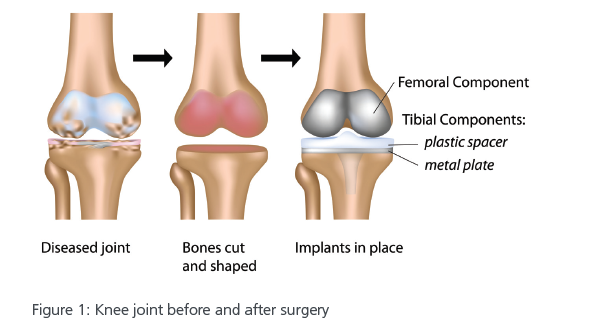Book Appointment Now

Understanding Knee Replacement Surgery: What to Expect and How to Prepare
- On
- InGuide
Knee replacement surgery, also known as knee arthroplasty, is a common procedure designed to relieve pain and restore function in severely diseased knee joints. If you’re considering or scheduled for this surgery, it’s essential to understand the process, what to expect, and how to prepare for a successful outcome.
What is Knee Replacement Surgery?
Knee replacement surgery involves removing damaged cartilage and bone from the surface of your knee joint and replacing them with artificial components made of metal and plastic. This procedure can significantly alleviate pain and improve mobility for individuals suffering from conditions such as osteoarthritis, rheumatoid arthritis, or severe knee injuries.
What to Expect During the Procedure
Pre-Surgery Preparation:
- Your orthopedic surgeon will conduct a thorough evaluation, including medical history, physical examination, and imaging tests such as X-rays or MRIs.
- You may need to undergo a pre-surgical health check to ensure you are fit for anesthesia and the surgery itself.
During the Surgery:
- Knee replacement surgery typically takes about 1 to 2 hours.
- You will be under spinal or general anesthesia to ensure you are comfortable and pain-free.
- The surgeon will make an incision over your knee to access the joint, remove the damaged parts, and install the artificial components.
Post-Surgery Recovery:
- After the surgery, you’ll be taken to a recovery room where you will be monitored as the anesthesia wears off.
- Most patients can begin physical therapy within 24 hours to start regaining strength and mobility.
- Hospital stays usually last a few days, but this can vary depending on your progress and overall health.
How to Prepare for Knee Replacement Surgery
Educate Yourself:
- Understand the procedure, potential risks, and benefits by reading reputable sources and discussing with your surgeon.
Pre-Surgery Exercises:
- Engage in exercises to strengthen the muscles around your knee, as this can aid in your recovery process.
Home Preparation:
- Arrange your living space to minimize the need for excessive movement. Consider safety measures like installing handrails and removing trip hazards.
Plan for Assistance:
- You’ll need help with daily activities for the first few weeks post-surgery. Arrange for a family member, friend, or professional caregiver to assist you.
Follow Pre-Surgery Instructions:
- Your surgeon may provide specific instructions, such as fasting before surgery, adjusting medications, and avoiding certain substances.
Recovery Tips
Follow Rehabilitation Protocols:
- Adhere strictly to your physical therapy and rehabilitation program to ensure the best recovery.
Manage Pain and Swelling:
- Use prescribed medications and follow recommended techniques, such as ice packs, to manage post-surgical pain and swelling.
Stay Active but Safe:
- Gradually increase your activity level as advised by your therapist, but avoid high-impact activities that could strain your new knee.
Maintain a Healthy Diet:
- Proper nutrition is crucial for healing. Focus on a balanced diet rich in protein, vitamins, and minerals.
Knee replacement surgery can be life-changing, offering significant pain relief and improved mobility. By understanding what to expect and adequately preparing, you can ensure a smoother surgery and recovery process. If you have any concerns or questions, don’t hesitate to reach out to your orthopedic specialist.
Newsletter Updates
Enter your email address below and subscribe to our newsletter



